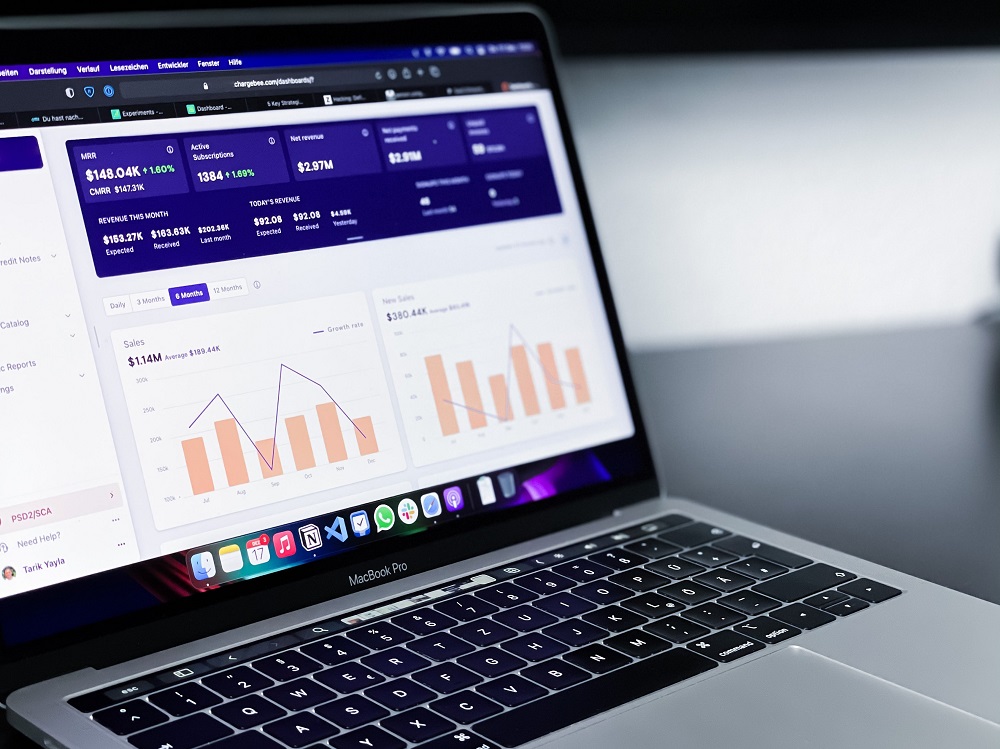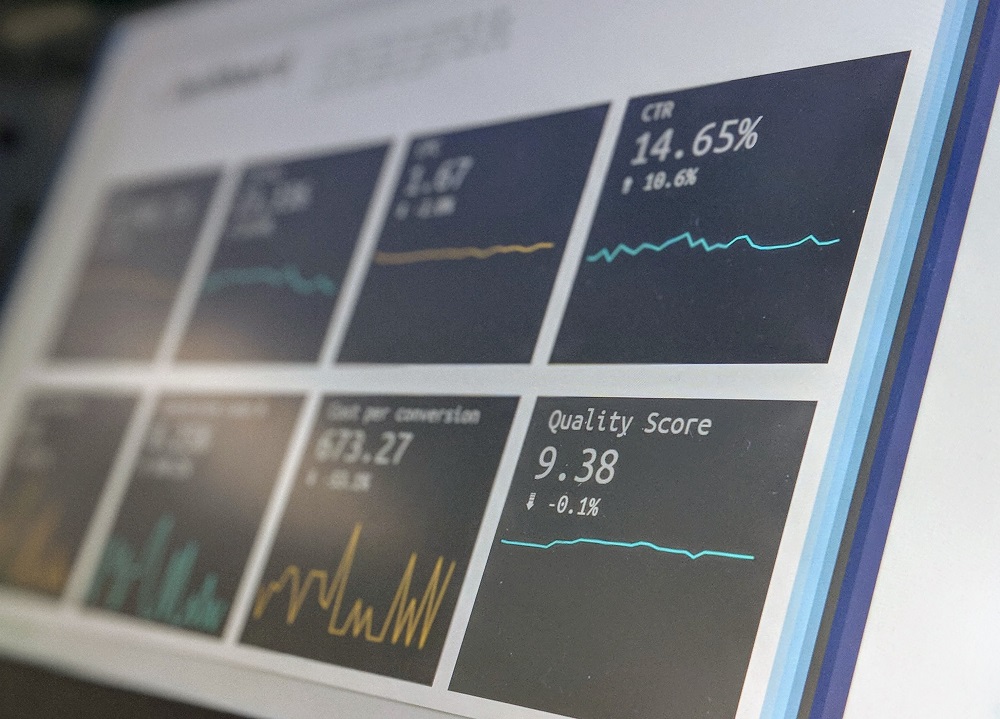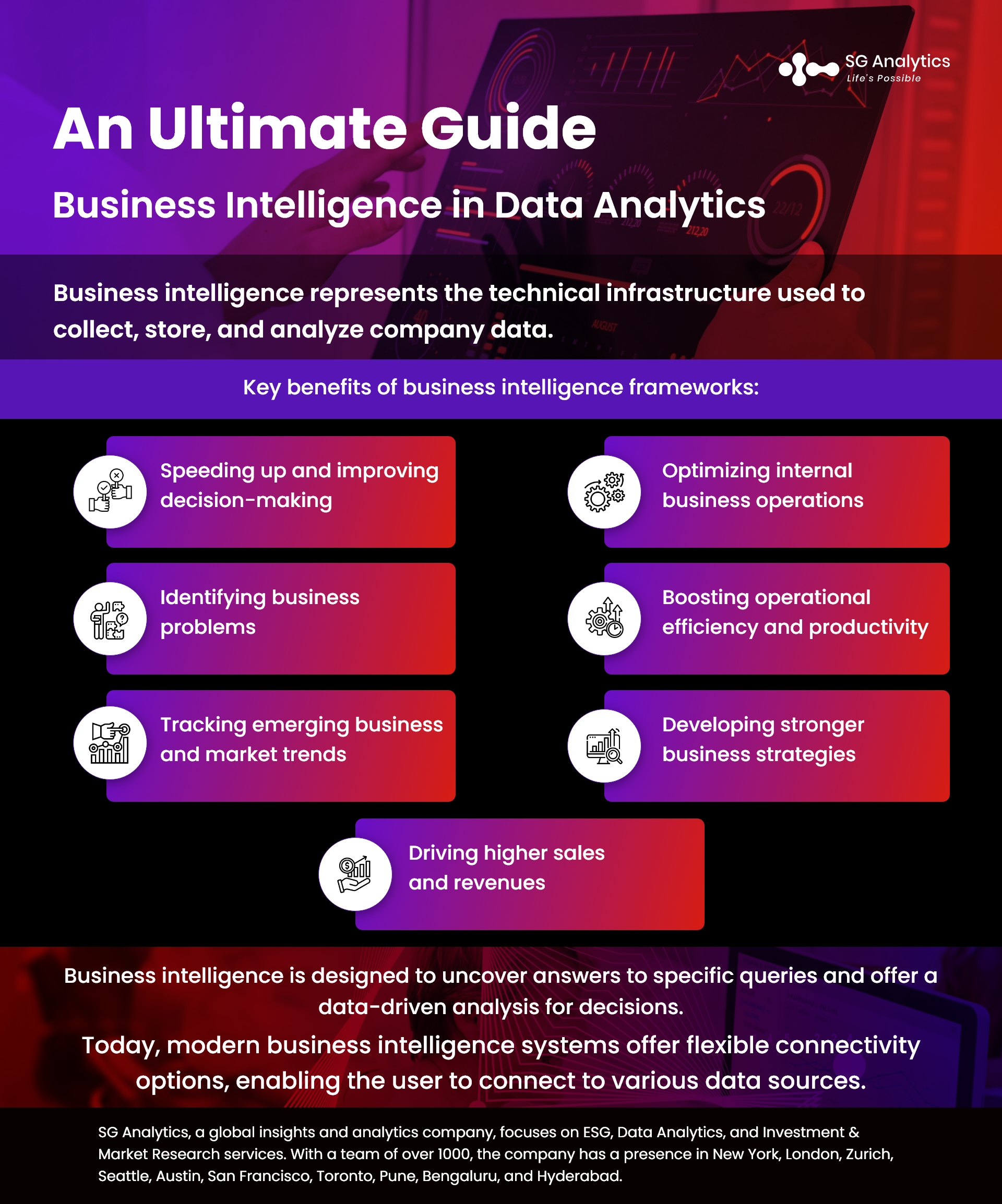Business intelligence incorporates business analytics, data mining, data analytics tools, and data visualization to help organizations make data-driven decisions. However, it is important to note that business intelligence (BI) is more than a buzzword. Traditional business intelligence programs were developed for decision-making and to turn data into insights for IT-reliant service solutions.
Today modern business intelligence offers businesses a comprehensive view of their organization's data and uses that data to drive change as well as eliminate inefficiencies. To quickly adapt to existing market or supply changes, modern business intelligence solutions are enabling them to prioritize the flexible analysis of governed data across trusted platforms, thereby empowering business users.
What is Business Intelligence (BI)?
Business intelligence, or BI, is a technology-driven process employed to analyze data and derive actionable information that assists executives, managers, and workers in making informed business decisions. As a significant part of the BI process, organizations accumulate data from internal IT systems as well as external sources, prepare it for analysis, and then run queries against the data to create data visualizations, BI dashboards, and reports. The generated results are then made available to business users for operational decision-making. A process of obtaining business insights, business intelligence (BI) involves:

-
Real-time monitoring of data
-
Dashboard development and reporting
-
Benchmarking
-
Performance management
-
Data and text mining
-
Data Analytics
Read more: The Future of Business Intelligence: Top Trends for 2023 and Beyond
Why is Business Intelligence Important?
The role of business intelligence is to enhance an organization's business operations with relevant data insights. Companies today are employing business intelligence tools and techniques to translate their collected data into valuable insights. These insights are then used to inform business decision frameworks to increase productivity and revenue, leading to accelerated growth.
The ultimate goal of business intelligence is to drive better business decisions, enabling organizations to boost their revenue, enhance their operational efficiency, and gain a competitive advantage over other businesses. Business intelligence incorporates varied processes and tasks vital for businesses. And data analytics is a major tool within BI as it helps in ultimately piecing the larger puzzle. However, to achieve this goal, businesses need to incorporate a combination of business intelligence and data analytics, along with data management and reporting tools for efficiently managing and analyzing data.

Business Intelligence Use Cases
Business intelligence offers narrower business benefits, making it simple for organizations to organize, track, and maintain the status of data operations and gather competitive intelligence on their rivals. In addition, it also helps in analyzing different aspects of technology and analytics. Some examples of enterprise business intelligence use cases include:
-
monitoring business performance and other metrics
-
backing decision-making and strategic planning
-
evaluating business procedures
-
deriving useful information about customers, supply chains, and other elements of operations
-
detecting trends and market patterns
Benefits of Business Intelligence
A successful business intelligence program helps in generating a variety of business benefits for an organization. Business intelligence enables C-suite executives and department managers to scrutinize their business performance to act quickly when issues or opportunities arise. By analyzing customer data, they can make marketing, sales, and customer service efforts more influential. Business intelligence can be employed across the supply chain and manufacturing and distribution channels to detect crises before they cause any financial harm.

Read more: Sustainable Fashion: Top Ethical Fashion Trends to Know In 2023
The key benefits that businesses can get from business intelligence frameworks include the following:
-
speeding up and improving decision-making
-
optimizing internal business operations
-
boosting operational efficiency and productivity
-
identifying business problems
-
tracking emerging business and market trends
-
developing stronger business strategies
-
driving higher sales and revenues
Importance of Business Intelligence in Data Analytics
Business Intelligence platforms are being used increasingly as front-end interfaces for big data analytics systems. They contain a combination of structured, unstructured, and semi-structured data. Modern business intelligence systems offer flexible connectivity options, enabling the user to connect to a range of data sources. This and the relatively simple user interface make them a good fit for big data architectures.

With the data landscape growing at a much faster pace and organizations gathering, storing, and analyzing heaps of data, the process is becoming more complex. It is, therefore, important for organizations to consider the connection between business intelligence and big data. Big data analytics today has become a bit of a buzzword in the industry, and data experts define it as measures employed to volumes of data to identify vital insights. It is the main defining factor, as the amount of data is ever-rising and easy to store for a long time period.
BI tools users have access to Spark systems, NoSQL databases, and other big data platforms. In addition to conventional data warehouses, it helps them in gaining a unified view of the diverse data stored. With a BI framework, many potential users can get involved in analyzing big data sets. Alternatively, big data systems operate as staging areas to process raw data that can be filtered and stored in a data warehouse for analysis.
While it is important for BI as businesses are creating more data every year, and BI platforms must keep up with the rising demands. A good platform will enable businesses to grow with increasing demands. However, if not maintained, the BI dashboards and data sources may fall behind.
Read more: Technology Investment: Top Trends for 2023
Business Analytics: How Business Intelligence and Data Analytics Can Work Together
Business intelligence involves data analytics, and business analytics uses both as a part of the process. Business intelligence helps users to conclude data analysis. Data scientists dig into data specifics by employing advanced statistics and predictive analytics to discover and forecast future patterns. Business analytics encompasses data mining along with predictive analytics, applied analytics, and statistics to conduct data analytics as part of the intelligence strategy.
Business intelligence is designed to uncover answers to specific queries and offer a data-driven analysis for decisions. However, organizations are now using the process of analytics to enhance their follow-up questions and iteration. With this cycle of analytics, businesses are integrating analytics to react to changing consumer expectations.

Key Highlights
-
Business intelligence represents the technical infrastructure employed by organizations to collect, store, and analyze company data.
-
It parses data and generates reports and information to equip managers to make better decisions.
-
Software companies are designing new business intelligence solutions to make better use of their data.
-
BI tools and software are available in different forms, like reporting/query software, data visualization software, and data mining tools.
-
Business intelligence offers a definitive approach to analytics, enabling individuals without a technical background to access and explore data insights.
Read more: Integrating Data and Artificial Intelligence in Business Strategy to meet ESG Goals

The Future Role of Business Intelligence: Final Thoughts
Business intelligence is evolving continually to keep up with the growing pace of business needs and technology. With the emerging trends, businesses have to stay users up to date with innovations as well as changing consumer preferences. While artificial intelligence (AI) and machine learning (ML) will continue to grow, businesses are integrating the insights from AI into a broader business intelligence framework. Companies are striving to be more data-driven and making more efforts to share data and collaborate. Data visualization is also emerging as an essential component of working together across teams and departments.
Business intelligence also offers capabilities like real-time sales tracking, enabling users to discover new insights into customer behavior as well as to forecast profits. Diverse industries, including retail and insurance, have also adopted BI, and more are joining every year.
It is important to note that business intelligence relies heavily on data analytics. The framework cannot function without it. Conversely, data analytics, which is heavily integrated into every business operation, functions well with the framework to generate precise business insights. While business intelligence framework is being used in prominent ways in data analytics, it is functional across other fields, too.
With a presence in New York, San Francisco, Austin, Seattle, Toronto, London, Zurich, Pune, Bengaluru, and Hyderabad, SG Analytics, a pioneer in Research and Analytics, offers tailor-made services to enterprises worldwide.
A leader in Data Analytics, SG Analytics focuses on leveraging data management and analytics, and data science to help businesses discover new insights and build strategies for business growth. Contact us today if you are looking to make critical data-driven decisions to prompt accelerated growth and breakthrough performance.









